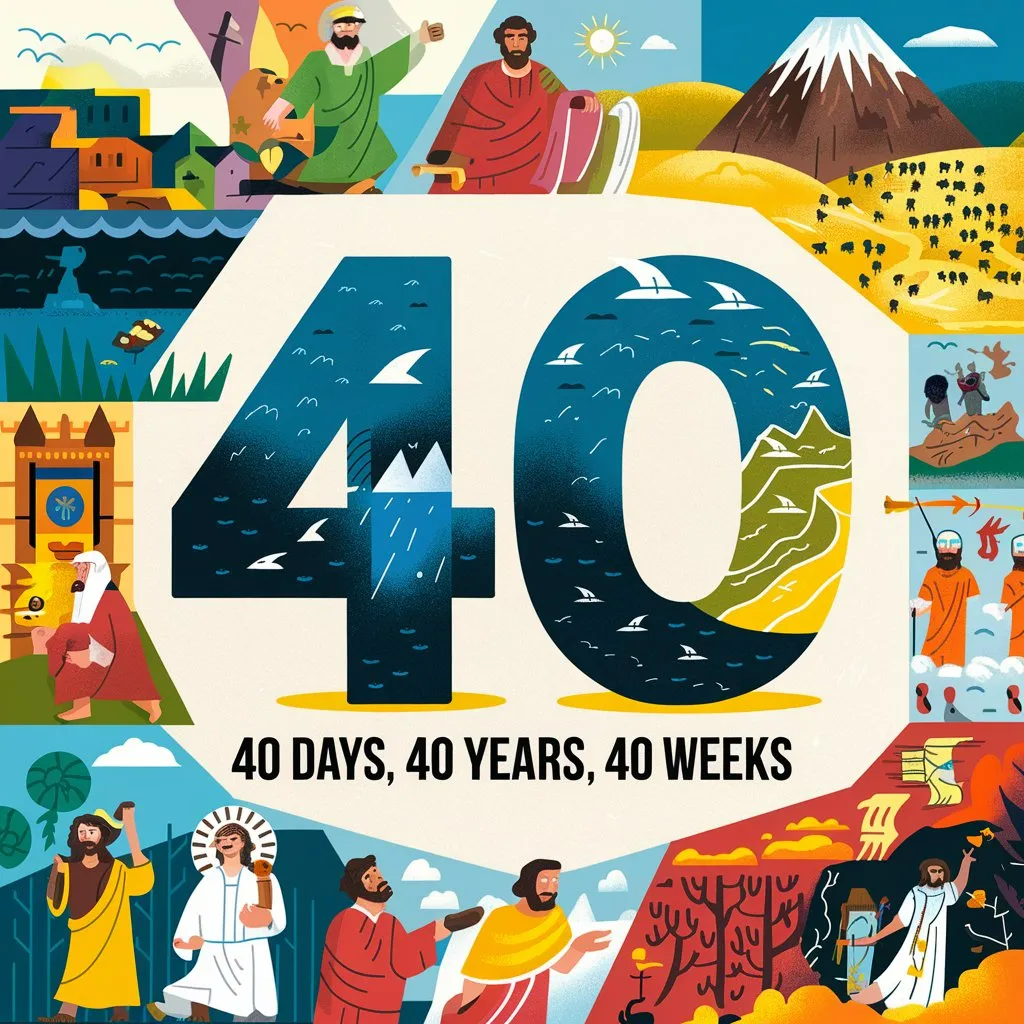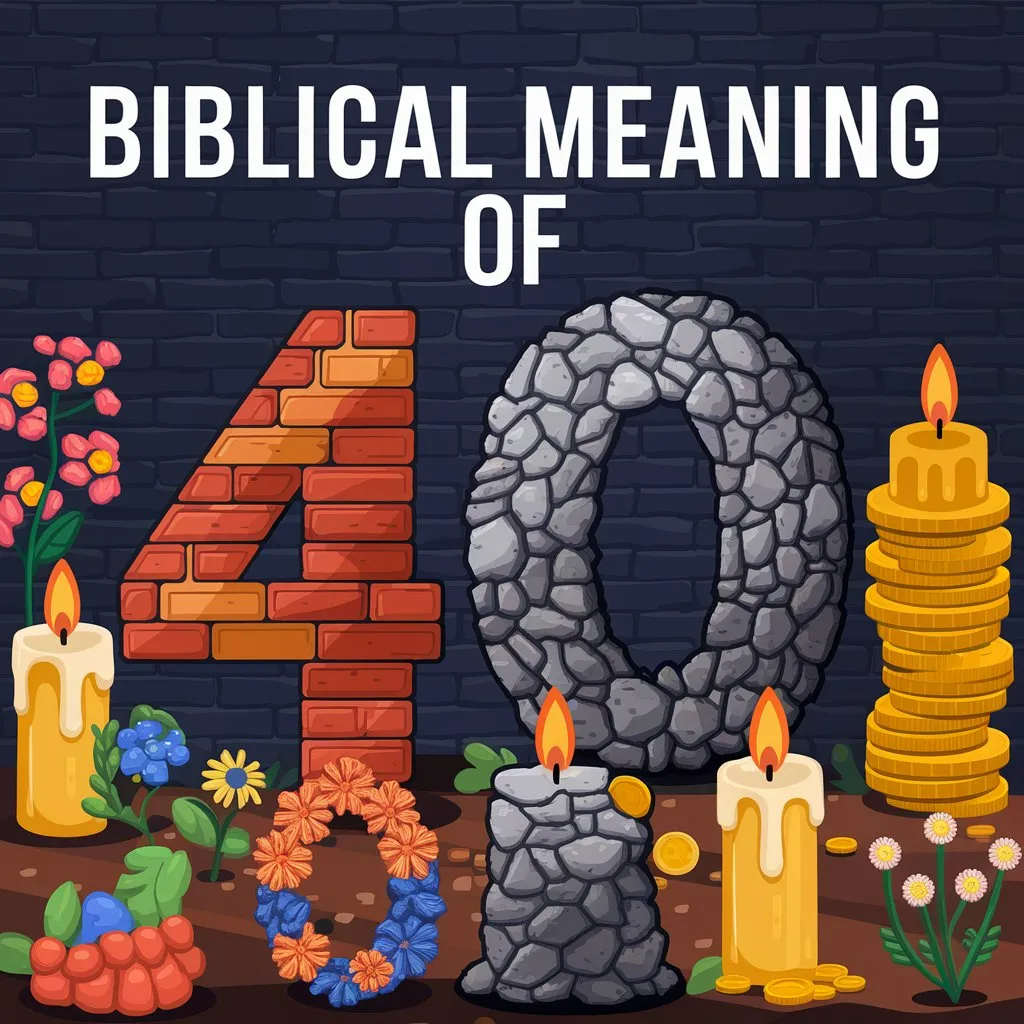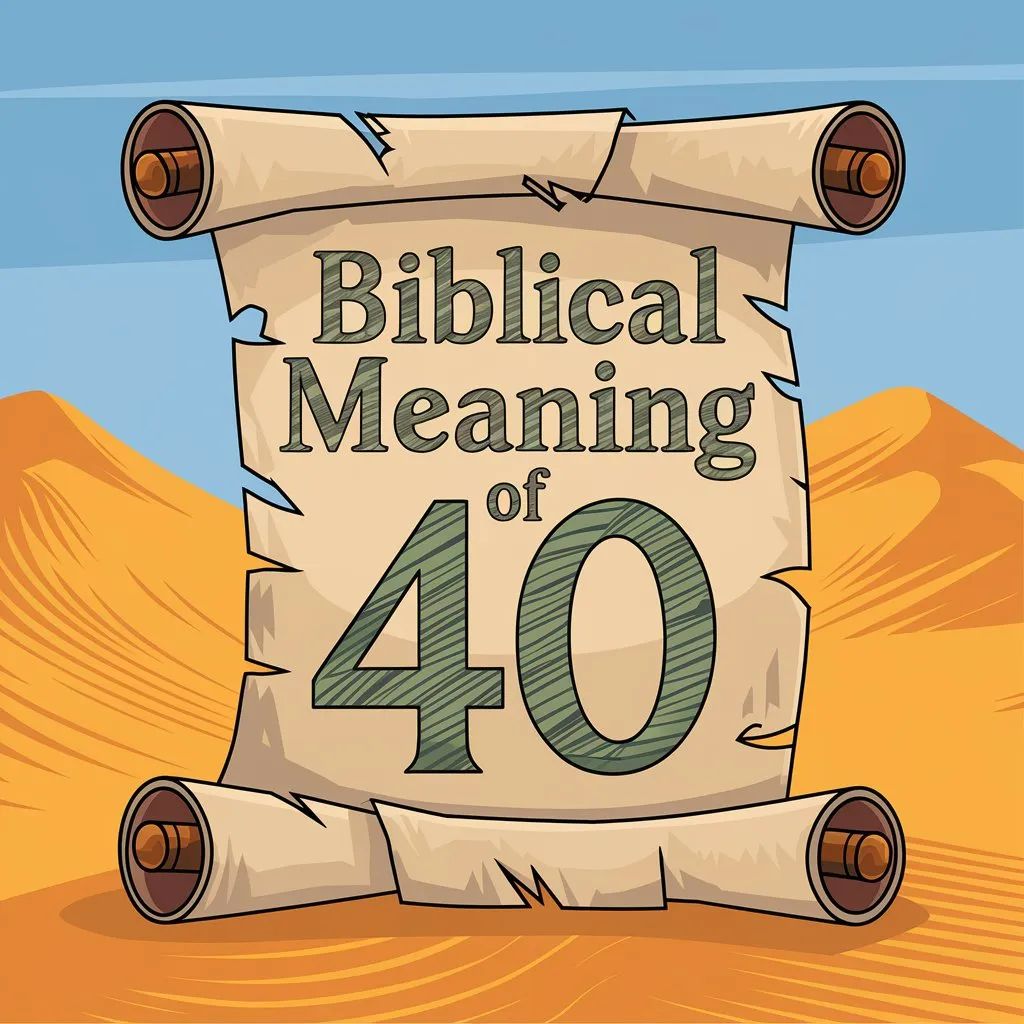The Biblical Meaning of 40 Revealed: Testing and Trial
As you explore the pages of Scripture, you’ll notice a recurring pattern: the number 40. It’s more than just a numerical value – it’s a symbol of testing and trial. You’ll find it in the Israelites’ 40-year wilderness journey, Moses’ 40-day stay on Mount Sinai, and Elijah’s 40-day trek to Horeb.
Even Jesus fasted for 40 days in the wilderness, mirroring the Israelites’ experience. But what’s the significance of this number? Why does it keep popping up in the most pivotal moments of biblical history?
At a Glance
- The number 40 in the Bible signifies a period of testing and trial, refining faith and character, as seen in the Israelites’ wilderness journey.
- Jesus’ 40-day fast in the wilderness mirrors the Israelites’ 40-year journey, highlighting the importance of testing and trial in spiritual formation.
- Trials and tribulations serve as a crucible, refining spiritual gifts, and cultivating empathy and compassion for effective ministry to others.
- Wilderness experiences, like the Israelites’, teach that God is always at work, even in darkness, and that faith is refined in the wilderness.
- The purpose of wilderness experiences is to refine and perfect faith, leading to spiritual maturity, dependence on God, and discernment of His voice.

Noah’s Flood: 40 Days of Rain
Forty days and forty nights, a duration famously associated with divine intervention, marked the catastrophic downpour that devastated the earth during Noah’s Flood.
You may wonder what significance this period holds in the biblical narrative. The answer lies in the Flood’s purpose: to purify the earth of humanity’s corruption.
The 40-day deluge served as a testing period, separating the righteous from the wicked. The floodwaters, which reached a height of 15 cubits above the mountains, destroyed every living creature, except for Noah and the animals on the ark.
The Rainy aftermath, however, wasn’t the end. It marked the beginning of a new era, where God established a covenant with Noah, promising never again to destroy the earth with a flood.
The 40-day duration also symbolized a transformative process, where the old was washed away, and the new was born.
As you reflect on the Flood narrative, consider the significance of this testing period in your own life. Just as the floodwaters cleansed the earth, you too can experience spiritual renewal and transformation through trials and tribulations.
Moses’ Wilderness Wanderings
As you reflect on the transformative power of the 40-day deluge, you might wonder how this duration figures into other pivotal moments in the biblical narrative.
One such instance is the Israelites’ wilderness wanderings under Moses’ leadership. Here, the 40-year duration assumes a distinct significance, as the Israelites faced a protracted period of testing and trial.
During this time, they grappled with Wilderness struggles, confronting their own faithlessness and God’s faithfulness. The Desert lessons they learned were multifaceted, ranging from the provision of manna to the WATER FROM THE ROCK.
Through these experiences, God refined the Israelites, purging their idolatrous inclinations and shaping them into a covenant people.
The 40-year sojourn in the Wilderness served as a crucible, where their character was tested and their dependence on God was deepened.
As you ponder Moses’ Wilderness wanderings, you’re reminded that the biblical meaning of 40 extends beyond mere chronology, encapsulating the transformative power of testing and trial.
This duration symbolizes a season of spiritual refinement, where God’s people are molded into vessels fit for His purposes.

Jesus’ Temptation in the Wilderness
The Wilderness, a domain of spiritual testing, beckons once more as you plunge into Jesus’ Temptation in the Wilderness.
You’re transported to a sphere where the Son of God faces the ultimate spiritual warfare. In this desert solitude, Jesus is tempted by Satan, the ultimate deceiver, who seeks to undermine His divine mission.
As you explore further, you realize that Jesus’ 40-day fast in the wilderness mirrors the Israelites’ 40-year wilderness journey.
Both experiences underscore the significance of testing and trial in spiritual formation. Jesus’ temptation serves as a precursor to His public ministry, demonstrating His unwavering commitment to God’s will.
In this desolate landscape, Jesus confronts the enemy, responding to each temptation with scripture, thereby exemplifying the importance of spiritual preparedness.
His victory in the wilderness sets the stage for His subsequent ministry, as He sets out on a journey to redeem humanity from the clutches of sin.
The Significance of 40 in Scripture
Scripture’s numeric tapestry is woven with deliberate intention, and the number 40 emerges as a recurring thread, imbued with profound significance.
You’ll find this number woven throughout the fabric of Scripture, revealing a deeper spiritual significance.
The Israelites wandered in the wilderness for 40 years, a period of testing and trial that prepared them for the Promised Land.
Moses spent 40 days on Mount Sinai, receiving the Ten Commandments and establishing a covenant with God.
Elijah, too, journeyed 40 days to Horeb, seeking guidance and renewal.
These Biblical patterns reveal a consistent theme: 40 represents a period of testing, refinement, and spiritual preparation.
As you explore the significance of 40 in Scripture, you’ll discover a deeper understanding of God’s character and His purposes for your life.
The number 40 serves as a reminder that spiritual growth often requires perseverance, patience, and trust in God’s sovereignty.
Trials Prepare Us for Ministry
One’s wilderness experiences often serve as a prerequisite for effective ministry, as exemplified by the lives of numerous biblical figures.
You, too, can expect to face trials that prepare you for the ministry God has called you to. These trials aren’t meant to break you but to build your faith and equip you for the task ahead.
Through these experiences, you’ll develop the spiritual preparation necessary to minister to others effectively.
You’ll learn to rely on God’s strength, not your own, and trust in His sovereignty. This spiritual refining process is essential for building a strong foundation for your ministry.
Here are three ways trials prepare you for ministry:
- Deepen your understanding of God’s character: As you navigate the wilderness, you’ll gain a deeper understanding of God’s nature, His love, and His faithfulness.
- Develop your spiritual gifts: Trials provide an opportunity to develop and refine your spiritual gifts, allowing you to minister more effectively to others.
- Cultivate empathy and compassion: Through your own struggles, you’ll develop a deeper sense of empathy and compassion, enabling you to minister to others with greater sensitivity and understanding.
Spiritual Refining Through Suffering
As you emerge from the wilderness of trials, you’re likely to find that suffering has refined your spirit, much like fire purifies gold.
This spiritual refining process is a crucible that burns away impurities, revealing a stronger, more resilient faith. Through the trials, your soul has undergone a profound transformation, emerging more radiant and pure.
The purification of your faith has been a gradual process, but the results are undeniable.
As you reflect on your journey, you’ll realize that the struggles have stripped away the superficial, leaving only the essence of your spirit.
Your soul, once weighed down by doubts and fears, now soars with a renewed sense of purpose. The trials have taught you to rely on God’s strength, rather than your own, and this dependence has fostered a deeper trust in His sovereignty.
This spiritual refining has been a painful but necessary process, for it has transformed you into a vessel fit for the Master’s use.
God’s Sovereignty in Hard Times
Forty days and nights of relentless rain poured down on the earth, flooding it with destruction, yet simultaneously washing away the wickedness of humanity.
You may wonder, where was God in all this chaos? Was He absent or indifferent to the suffering of His creation?
The answer lies in His sovereignty. God’s sovereignty isn’t about His absence, but about His divine guidance in the midst of turmoil.
In hard times, you may struggle with faith, questioning God’s presence and care.
But know that He’s always in control, even when you can’t see or feel Him. His sovereignty isn’t about avoiding difficulties, but about using them to refine and transform you.
- God’s ways are higher than yours: His plans and purposes are often beyond your comprehension, but that doesn’t mean they’re not good.
- Faith isn’t about feeling, but about trusting: Even when you can’t see or feel God, you can trust in His goodness and love.
- God’s sovereignty isn’t about comfort, but about transformation: He uses hard times to shape and mold you into the person He created you to be.
Lessons From the Israelites’ Journey
Through the wilderness of Sinai, the Israelites set out on a 40-year journey, beset on all sides by trials and tribulations.
You, too, may find yourself traversing a similar landscape, where God’s silence seems deafening and your struggles appear insurmountable.
As you navigate these treacherous waters, remember that the Israelites’ struggles served a purpose – to test their faith and refine their character.
Their journey was marked by periods of God’s silence, where His presence seemed absent.
Yet, in these moments, they were forced to rely on their faith, trusting that He was still with them, even when they couldn’t see or feel Him.
You, too, may experience seasons of God’s silence, but know that it’s not a sign of abandonment.
Rather, it’s an opportunity to deepen your trust in Him, to lean on His promises, and to find comfort in His sovereignty.
The Israelites’ journey teaches you that even in the darkest of times, God is always at work, shaping you into the person He desires you to be.
The Purpose of Wilderness Experiences
In the domain of spiritual growth, wilderness experiences serve as a crucible, refining and perfecting your faith.
You’ll find that these challenging circumstances aren’t meant to destroy you, but to prepare you for the promises God has in store. In the wilderness, you’re stripped of distractions, and your focus is redirected to the One who sustains you.
This desert preparation is essential for spiritual maturity, as it allows you to develop a deeper dependence on God.
Through wilderness discipline, you’ll discover the following benefits:
- Self-reflection and introspection: The wilderness forces you to confront your weaknesses, fears, and doubts, allowing you to address areas that need improvement.
- Dependence on God: As you face trials, you’ll learn to rely on God’s provision, guidance, and strength, rather than your own abilities.
- Spiritual clarity: The wilderness experience helps you discern God’s voice, separating His will from your own desires, and aligning your heart with His purposes.
In this refining process, you’ll emerge stronger, wiser, and more confident in your faith, ready to fulfill the calling God has placed on your life.
Finding Hope in Times of Trial
Hold on to hope, for it’s the anchor that sustains you in the turbulent waters of trial.
When the wilderness of testing and trial besets you, it’s easy to feel lost and forsaken. But hope is the lifeline that tethers you to the promises of God, reminding you that He’s always with you, even in the darkest moments.
In times of trial, your faith is refined, like gold in the fire.
It’s an opportunity for heart renewal, where the dross of doubt and fear is burned away, revealing a faith unwavering and strong. You emerge from the crucible with a deeper understanding of God’s character and a trust that’s unshakeable.
FAQs
Can the Number 40 Be Seen as a Symbol of Imperfection or Incompleteness?
You might wonder if the number 40 signifies imperfection or incompleteness, reflecting human frailty. However, it can also represent Divine patience, underscoring God’s willingness to work with and through our limitations, ultimately perfecting us in His time.
Is the Concept of 40 Days Limited to Biblical Accounts Only?
You’ll discover that the concept of 40 days isn’t exclusive to biblical accounts; it holds cultural significance in various historical contexts, such as ancient Mesopotamia and Egypt, where it symbolized a period of transformation or purification.
What Is the Connection Between 40 and the Concept of Purification?
As you explore into the connection between 40 and purification, you’ll find that this sacred number is often linked to ritual cleansing and spiritual refinement, symbolizing a transformative process that refines your inner self, much like fire purifies metal.
Can 40-Day Periods Be Seen as a Form of Spiritual Boot Camp?
As you set out on a 40-day period, you’ll find it can be a transformative spiritual boot camp, propelling your faith journey forward, where you’ll confront challenges, refine your character, and accelerate spiritual growth, ultimately emerging stronger, wiser, and more resilient.
Is the Significance of 40 Limited to Christian Theology Only?
You’ll discover that the significance of 40 transcends Christian theology, holding cross-cultural significance and religious parallels in Judaism, Islam, and Hinduism, where 40-day periods symbolize spiritual refinement, purification, and transformation.

Hi, I’m Aurelia Starfrost, your spiritual guide at InsightfulSpiritual.com. I love exploring ancient wisdom and modern practices to help you on your journey. With a focus on meditation and energy healing, I’m here to guide you to find solace within and discover your spiritual essence.







